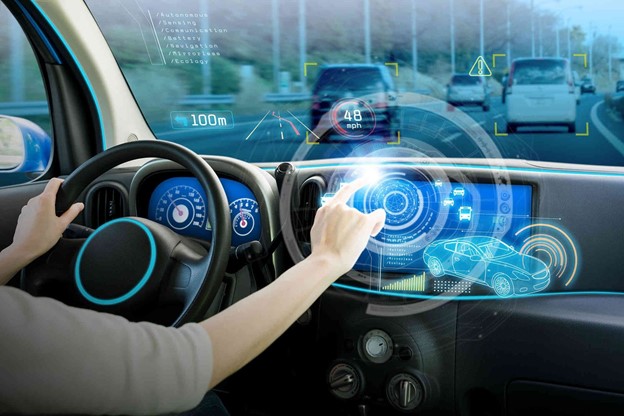Car infotainment systems are redefining the automotive industry, blending advanced software, connectivity, and user interfaces to create immersive in-car experiences. As these systems become central to vehicle differentiation, they also fuel complex intellectual property (IP) disputes, making them a critical focus for IP litigation attorneys. The global car infotainment market is expected to reach $15.1 billion by 2030, according to Statista, underscoring the high stakes in related legal battles. For attorneys, understanding the technical and legal intricacies of these systems, often clarified by a software expert witness, is essential for effective IP litigation.
The Rise of Car Infotainment Systems
Car infotainment systems have evolved from basic radio and navigation tools into sophisticated platforms integrating AI, voice assistants, and app connectivity. Systems like Android Auto and Apple CarPlay enable seamless smartphone integration, while Mercedes’ MBUX Hyperscreen uses AI-driven Zero Layer technology to anticipate user needs based on behavior, time, and location, as highlighted by Autoblog. Non-luxury brands are also advancing, with Kia’s UVO offering features like Parking Minder and EV energy usage data, and Hyundai’s Blue Link enabling diagnostic checks, as noted by CARFAX. These software-heavy systems are prime targets for patent infringement and trade secret disputes, requiring attorneys to leverage insights from a software expert witness to dissect proprietary technologies.
Key Trends Shaping Infotainment Systems and IP Litigation
Several trends in car infotainment systems are driving innovation and creating IP litigation challenges:
Subscription-Based Monetization
With an estimated 470 million connected vehicles by 2025, automakers are adopting subscription models for infotainment features. Platforms like Android Auto and Apple CarPlay already provide app access, but new car-specific apps and services are emerging. These models often rely on proprietary software, raising issues of licensing agreements and patent infringement. Attorneys must scrutinize licensing terms and software implementations, where a software expert witness can clarify whether a feature infringes on existing patents or violates trade secrets.
Vehicles as Data Platforms
Original equipment manufacturers (OEMs) are developing human-machine-interface (HMI) systems to compete with native infotainment platforms. By leveraging data across vehicle models, OEMs create personalized experiences, positioning cars as data platforms. This data-driven innovation introduces IP risks, such as disputes over data processing algorithms or proprietary interfaces. Attorneys can benefit from a software expert witness to analyze the technical scope of patents or trade secrets in these cases, ensuring accurate claim construction.
5G Patent Disputes
The integration of 5G connectivity has sparked significant patent disputes. Companies like Qualcomm and Nokia, holding roughly 70% of 4G patents essential for connected cars, are demanding licensing fees from automakers like Toyota and Honda, as reported by Reuters. As 5G becomes standard, these disputes will grow, requiring attorneys to understand the technical nuances of connectivity patents. A software expert witness can provide critical analysis of patented technologies, helping attorneys differentiate between essential and non-essential patents in licensing negotiations.
Regulatory Considerations in IP Litigation
Infotainment systems, now standard in nearly all new vehicles, face increasing regulatory scrutiny due to privacy, security, and distracted driving risks. Governments may impose regulations similar to those faced by smartphone and smart TV manufacturers, creating compliance challenges for automakers. For IP litigation attorneys, regulatory frameworks can influence patent validity or infringement claims, particularly if safety-related features are patented. A software expert witness can help attorneys evaluate whether a system’s software complies with emerging standards or infringes on safety-related patents.
Insights for Litigation Attorneys
IP litigation attorneys working on car infotainment cases should keep the following in mind:
- Technical Complexity of Software: Infotainment systems rely on complex software stacks, including operating systems, AI algorithms, and connectivity protocols. Attorneys should engage a software expert witness to dissect source code, identify proprietary elements, and determine infringement or misappropriation. For example, analyzing whether an AI-driven feature like MBUX’s Zero Layer infringes on a competitor’s patent requires deep technical expertise.
- Patent Scope and Claim Construction: Many infotainment disputes hinge on the scope of software and connectivity patents. Attorneys must carefully analyze patent claims, especially for 5G-related technologies, to avoid overbroad interpretations. A software expert witness can clarify technical terms and functionalities, strengthening arguments during claim construction hearings.
- Trade Secret Misappropriation: As automakers and OEMs collaborate across industries, trade secret disputes are rising. Attorneys should investigate whether proprietary algorithms or data processing methods were improperly shared or reverse-engineered. A software expert witness can trace the development history of disputed technologies to establish or refute misappropriation claims.
- Licensing Disputes: 5G patent disputes often involve standard-essential patents (SEPs), which require fair, reasonable, and non-discriminatory (FRAND) licensing terms. Attorneys must assess whether licensing demands align with FRAND obligations, using insights from a software expert witness to evaluate the technical necessity of patented components.
- Regulatory Impact on Litigation: Emerging regulations on distracted driving or data privacy may invalidate certain patents or limit their enforceability. Attorneys should monitor regulatory developments and consult a software expert witness to assess how compliance requirements affect the technical validity of IP claims.
Leveraging Expertise in IP Litigation
The rapid evolution of car infotainment systems demands specialized expertise in IP litigation. Patent infringement, trade secret disputes, and 5G licensing conflicts require attorneys to navigate both technical and legal complexities. A software expert witness plays a pivotal role by providing detailed analyses of software architectures, algorithms, and connectivity protocols, enabling attorneys to build robust cases.
For expert support in car infotainment system litigation, including market insights, trends analysis, and technical expertise, contact Sidespin Group. Their connected vehicle technology experts can assist with patent litigation, trade secret cases, and more.

